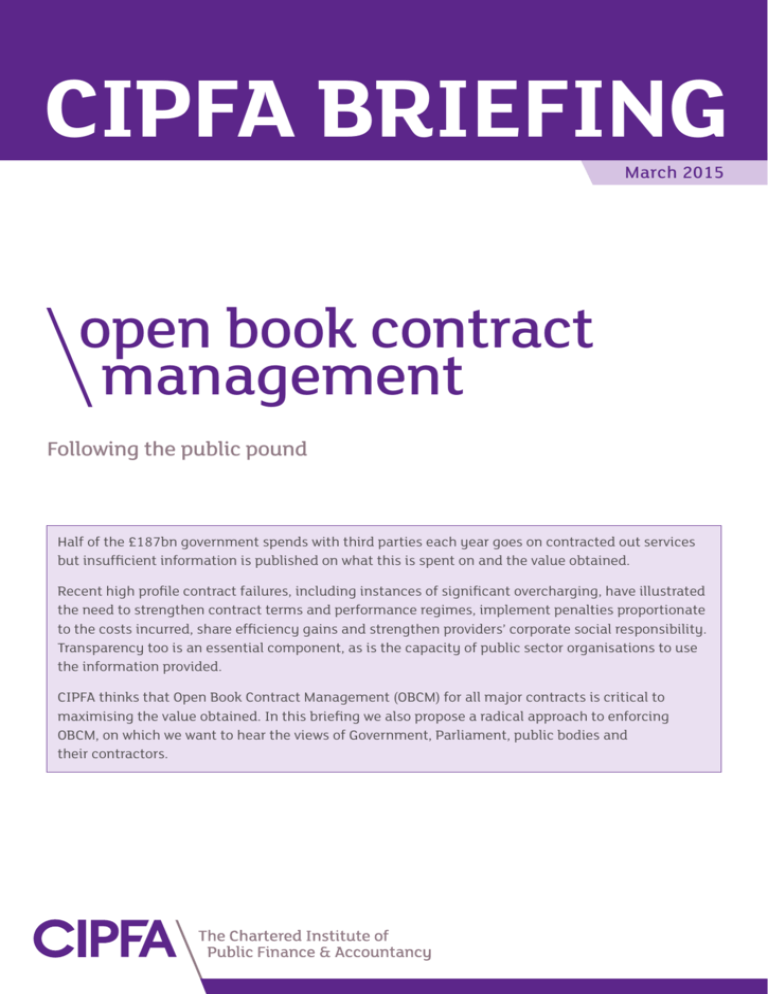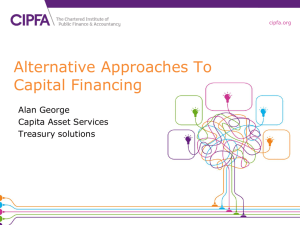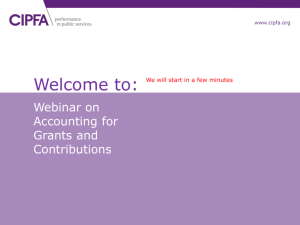open book contract management
advertisement

CIPFA BRIEFING March 2015 open book contract management Following the public pound Half of the £187bn government spends with third parties each year goes on contracted out services but insufficient information is published on what this is spent on and the value obtained. Recent high profile contract failures, including instances of significant overcharging, have illustrated the need to strengthen contract terms and performance regimes, implement penalties proportionate to the costs incurred, share efficiency gains and strengthen providers’ corporate social responsibility. Transparency too is an essential component, as is the capacity of public sector organisations to use the information provided. CIPFA thinks that Open Book Contract Management (OBCM) for all major contracts is critical to maximising the value obtained. In this briefing we also propose a radical approach to enforcing OBCM, on which we want to hear the views of Government, Parliament, public bodies and their contractors. What is Open Book Contract Management? Open Book Contract Management (OBCM) is an approach for procuring and delivering services in the public sector in a way that can deliver considerable cost savings and help drive real savings from the contracting process. It is based on the fundamental principle of pain/gain share – both the client and the contractor ‘own’ the costs. If the costs are well managed, both client and contractor have the opportunity to share any savings. Both share the risk if costs escalate. OBCM therefore focuses on value for money – not just lowest cost. OBCM allows public sector organisations to retain control of their contractual relationships by maintaining full transparency over how public funds are being used. It provides transparent processes that support the basis for clients to develop truly collaborative working relationships with their contracting partners with a view to: Understanding expenditure (cost base); Understanding the cost implications of decisions taken or being considered in delivering a project and forward investment; Operating and managing a target contract to incentivise and drive improvements in cost efficiency; and Encouraging clients and contractors (and their supply chains) to work together to develop and implement a proactive approach to project decision making. Open Book Accounting1 (OBA) supports OBCM, and has been adopted widely within the UK construction industry although it’s by no means universal. It requires the structured management and sharing of costing information between clients, contractors, and associated suppliers. OBCM requires a high degree of trust between the parties to avoid situations where hidden costs are transferred. It also requires robust management controls and appropriate incentive mechanisms to deliver both controlled costs for the client and a sustainable return. Public money and accountability ‘Holding to Account’ – the 2001 report by Lord Sharman on audit and accountability arrangements for central government – considered the questions of what ‘public money’ is and what degree of accountability and audit is appropriate. The report proposed the following definition for accountability purposes: “All money that comes into the possession of, or is distributed by, a public body, and money raised by a private body where it is doing so under statutory authority”. 1 The report identified a number of characteristics of a sound accountability regime for public money, including: Because of the special nature of public money, the obligations attaching to accountability in the public sector are likely to be more demanding than apply to private money. This does not mean that efforts should not be made to minimise this burden, but it does recognise that accountability and the provision of information have a price. Accountability goes beyond simply providing information, and must encompass expectations of scrutiny, and the prospect for revision or redress. Accountability arrangements should aim to be proportionate to the amount of money involved and the degree of risk associated with the activities under consideration. Accountability mechanisms in place should be cost effective, avoiding duplication and distorting effects by excessive demands for information. Accountability arrangements should seek to provide effective incentives within public bodies to encourage high class performance and not stifle change and innovation. CIPFA believes that this definition of the scope and characteristics of a sound accountability regime remain valid and should drive the design of arrangements for OBCM. Current use of Open Book Contract Management In February 2014 PAC published a report ‘Contracting out public Services to the Private Sector’ in which it stated that only one-third of government contracts currently require the use of open book, and that, even where such provisions exist, they are rarely used. However, a range of different transparency requirements are already in place. The Code of Recommended Practice for Local Authorities on Data Transparency requires them to publish details of any contract, commissioned activity, purchase order, framework agreement and any other legally enforceable agreement exceeding £5,000. Part 3 of the Transparency Code recommends that local authorities place on Contracts Finder, as well as any other local portal, every invitation to tender or invitation to quote for contracts to provide goods and/or services with a value that exceeds £25,000. Central government departments are already required to publish contracts over £10,000. The Crown Commercial Service has recently developed Contracts Finder to expand its CIPFA Open Book Accounting: How to deliver and demonstrate value for money in the public sector (2013) explains in detail the core premises and describes the principles, methodologies, and practices. CIPFA Briefing Paper / Open Book Contract Management March 20152 capability and make it easier for people to use, particularly for SMEs, who are looking to tender for public contracts. The recently introduced Public Contract Regulations 2015 oblige public bodies to advertise the following contracts on the Contracts Finder website: transparency was a necessity, covering OBA, open contracts and Freedom of Information. At the same hearing, a commitment to OBCM for large NHS contracts was also made. £25,000 or more, net of VAT, for sub-central authorities, including local authorities. Since then, the Cabinet Office has led work with central government departments to trial the wider use of OBA and to identify the sorts of contracts and the enhanced departmental capability necessary to secure the maximum benefit from open book accounting. The results of this work, including possible guidance on how and when to use OBA are still awaited. Other changes under these new regulations include the ability of contracting authorities to move away from evaluating the lowest delivery cost towards consideration of the whole-life/ long-term cost of the works, supplies or services procured. This should be underpinned by appropriate transparency clauses in the contract that will specify what data will be required from the contractor. Private sector contractors delivering public services are also expected to be made subject to Freedom of Information requirements. CIPFA thinks that a radical approach to enforcing OBCM is required. In order to be awarded all major contracts, contractors should agree that their own external auditors will provide a report to the client confirming that the amounts charged have been costed in accordance with the specified OBA procedures, and are consistent with the contractor’s own financial management and external reports. This combined with skilled resource, effective monitoring and proper supervision of the contract is essential. Policy developments The power of this approach would be that professionally regulated accountants working for the contractor, and on its board and audit committee, would be bound to ensure that the client had received a transparent and properly prepared account of the amounts due under the contract, and that the necessary contract governance processes were in place. £10,000 or more, net of VAT, for central government departments and agencies. In November 2013 the Government’s Chief Operating Officer (COO) and Chief Procurement Officer (CPO) signalled their willingness to hasten the use of open book accounting and greater openness and access by the National Audit Office (NAO) to the detail of central government contracts. In a House of Commons Public Accounts Committee (PAC) hearing on managing government suppliers, there was an agreement from the COO and CPO with PAC that greater CIPFA wants to hear the views of Government, Parliament, public bodies and their contractors on whether and how this more radical approach to OBCM should be adopted. CIPFA’s position on Open Book Contract Management (OBCM) 1 OBCM represents best practice in managing public contracts, and is crucial to maximising the value obtained from all major contracts. 2 Thresholds need to be set on a consistent basis for when OBCM should be applied by all major bodies across the public sector. 3 The characteristics of a sound accountability regime in ‘Holding to Account’ should drive the design of OBCM arrangements. 4 Guidance needs to be issued to public bodies on how to ensure that contractors of all sizes have effective governance and internal controls over all aspects of their operations, including in particular counter-fraud arrangements and effective internal audit. 5 OBCM for all key contracts must be supported by Open Book Accounting. 6 Guidance is required to improve the consistency, accuracy and efficiency of cost information collection from contractors. 7 Audited returns confirming compliance of charges with relevant OBCM and OBA requirements must be obtained for all key contracts. 8 Securing the full benefits of OBCM and OBA will require appropriate training for civil servants. 9 The penalties imposed on contractors who fail to deliver should reflect the full cost to the taxpayer of non-delivery. 10 All public audit bodies should be given adequate access rights to contractors. CIPFA Briefing Paper / Open Book Contract Management March 20153 References 1 CIPFA Open Book Accounting: How to deliver and demonstrate value for money in the public sector (2013) 6 Contracting out public services to the private sector – Public Accounts Committee, 47th report of 2013/2014 2 The role of major contractors in the delivery of public services, NAO (November 2013) 7 Statutory Instrument 2015 No. 102 – The Public Contracts Regulations 2015 3 Communities and Local Government Committee’s Sixth Report 8 ‘Growing your business’ a report on growing micro businesses, Lord Young May 2013 4 ‘Local government procurement’ (February 2014) 9 ‘Holding to account’ The Review of Audit and Accountability for Central Government, Lord Sharman of Redlynch, February 2001. 5 The Government’s response to the Local Government Committee’s Sixth Report (June 2014) Registered office: 77 Mansell Street, London E1 8AN T: 020 7543 5600 F: 020 7543 5700 www.cipfa.org The Chartered Institute of Public Finance and Accountancy. Registered with the Charity Commissioners of England and Wales No 231060. CIPFA Briefing Paper / Open Book Contract Management March 20154







